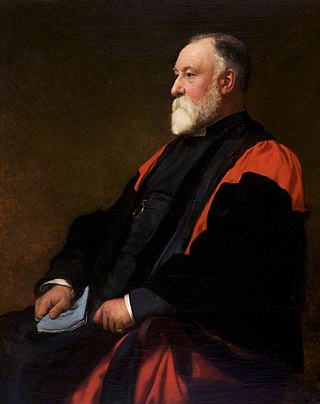Related Research Articles
William Kethe was a European churchman and Protestant Bible translator, especially of the Psalms.

Charles de Bourbon was a French prince du sang and military commander at the court of Francis I of France.

William Walter Merry (1835–1918) was an English classical scholar, clergyman, and educator.

Francis William Pember JP was an English first-class cricketer, lawyer and University of Oxford academic, where he served as Vice-Chancellor.

John May (Meye) was an English academic and churchman, who became Bishop of Carlisle. He also served the House of De Vere as cleric in Buckinghamshire.
Nicholas Robinson was a Welsh Bishop of Bangor and correspondent of Lord William Cecil, Sir Francis Walsingham, and Robert Dudley, 1st Earl of Leicester. He was also a dean and vice-president of a college at Queens' College, Cambridge.
Bartholomew Clerke (1537?–1590) was an English jurist, politician and diplomat. He became Dean of the Arches and a contemporary of Edward de Vere, 17th Earl of Oxford.
Richard Longworth was an English churchman and academic, Master of St John's College, Cambridge and Dean of Chester.
Thomas Fowle was a Church of England clergyman, Fellow of St John's College, Cambridge, rector of Redgrave and Hinderclay, Suffolk, and prebendary of Norwich Cathedral.

Rev. Euseby Isham, D.D. was an English academic administrator at the University of Oxford.

The Revd Theophilus Leigh, D.D. was an 18th-century Oxford academic of aristocratic descent.
Martin Culpepper was an English clergyman, medical doctor, and academic at the University of Oxford.
James Calfhill (1530?–1570) was an Anglican priest, academic and controversialist, who died as Archdeacon of Colchester and Bishop-designate of Worcester.
William Hughes was a Welsh bishop of St Asaph.
Thomas Francis was an English academic and physician, Provost of The Queen's College, Oxford and President of the London College of Physicians.
John Pory (1502/03–1570) was an English churchman and academic, Master of Corpus Christi College, Cambridge.
Edward Hawford D.D. was an English churchman and academic, Master of Christ's College, Cambridge from 1559. While Hawford was a somewhat conservative and administrative-minded academic politician head of house, no friend of religious enthusiasm and suspected of covert Catholicism. Christ's became a Puritan centre under his mastership.
The Venerable John Louth was Archdeacon of Nottingham from 1565 to 1590.
Hugh Brady, a native of Dunboyne, was Bishop of Meath from 21 October 1563 until his death on 13 February 1585.
References
- ↑ Salter, H. E.; Lobel, Mary D., eds. (1954). "Balliol College". A History of the County of Oxford: Volume 3: The University of Oxford. Victoria County History. pp. 82–95. Retrieved 25 July 2011.
- ↑ "Previous Vice-Chancellors". University of Oxford, UK. Retrieved 25 July 2011.
- ↑ University of Oxford (1888). "Vice-Chancellors". The Historical Register of the University of Oxford. Oxford: Clarendon Press. pp. 21–27. Retrieved 25 July 2011.
- ↑ Salter, H. E.; Lobel, Mary D., eds. (1954). "Lincoln College". A History of the County of Oxford: Volume 3: The University of Oxford. Victoria County History. pp. 163–173. Retrieved 25 July 2011.
- ↑ "Babington, Francis (BBNN544F)". A Cambridge Alumni Database. University of Cambridge.
- ↑ Lamb, Cambr. Doct. 176
- ↑ Gutch's WoodApp. 95
- ↑ Sir W. Scott's Tony Foster.
- ↑ Annals, anno 1562.
- ↑ Annals of Refor. i. chap. 43.